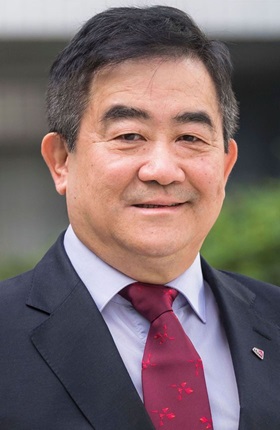Speakers


Prof. Alex JEN
Lee Shau-Kee Chair Professor of Materials Science; Director of Hong Kong Institute for Clean Energy
- City University of Hong Kong (CityU)
- Personal Website
Biography
Prof. Alex JEN is the Lee Shau-Kee Chair Professor and Director of the Hong Kong Institute for Clean Energy at the City University of Hong Kong. He also served as the Provost of CityU during 2016-2020. He received his B.S. from the National Tsing Hua University in Taiwan and Ph.D. from the University of Pennsylvania in USA. Before arriving at CityU, he had served as the Boeing-Johnson Chair Professor and Chair of the Department of Materials Science & Engineering at the University of Washington, Seattle. He was also appointed as the Chief Scientist for the Clean Energy Institute endowed by the Washington State Governor. He is a distinguished researcher who published more than 1000 papers with > 78,000 citations and an H-index of 144. He also co-invented 65 patents and disclosures. His interdisciplinary research covers organic/hybrid functional materials and devices for photonics, energy, sensors, and nanomedicine.
For his pioneering contributions in organic photonics and electronics, Professor Jen was elected as a Fellow by both the European Academy of Sciences and the Washington State Academy of Sciences. He was also elected as a Fellow for several professional societies, including AAAS, MRS, ACS, PMSE, OSA, and SPIE. He was named by the Times Higher Education (THE) in 2018 as one of the “Top 10 university researchers in Perovskite Solar Cell Research”. In addition, he was recognized by Thomson Reuters as one of the "World’s Most Influential Scientific Minds of 2015 and 2016 and as a "Highly Cited Researcher" in Materials Science from 2014-2021.
Integrated Material, Interface, and Process Engineering for Highly Efficient Organic, Perovskite, and Organic/Perovskite Hybrid Devices
Abstract
Minimizing energy loss and increasing the field factor are key aspects to transcend the current limitations on the performance of organic photovoltaics (OPV). However, an inherent limit has set for an organic bulk-heterojunction (BHJ) blends from prominent non-geminate recombination through non-radiative charge transfer states. Our recent study on charge recombination in BHJ and Planar-Mixed Heterojunction (PMHJ) blends comprising a crystalline polymer donor with Se-containing, Y6-derived non-fullerene acceptors has shown both high photovoltaic internal quantum efficiency and high external electroluminescence quantum efficiency. Crystallographic and spectroscopic studies reveal that the pseudo-2D, fused-ring molecular acceptors are not only intrinsically highly luminescent but also meets the criteria in achieving intrinsically radiative recombination within the blend, by promoting delocalized excitons with much longer luminescent lifetime and reduced exciton binding energies. These results provide the important demonstration of radiative non-geminate charge recombination in an efficient OPV blend. Moreover, a new concept of applying ”Dilution Effect” is introduced to explain the commonly observed composition-dependent Voc and reduced photovoltage loss in highly efficient ternary-based devices due to significantly reduced phonon-electron coupling. At the end, several novel interface engineering approaches will be introduced, which facilitated the demonstration of a record-high PCE of 24.8% in inverted perovskite solar cells.


